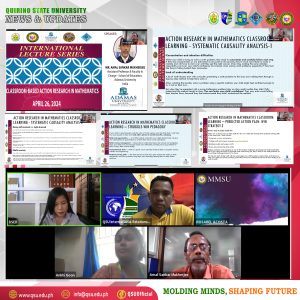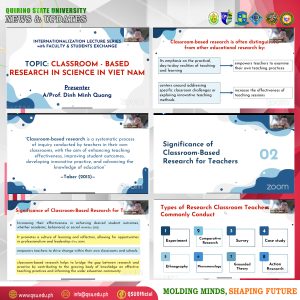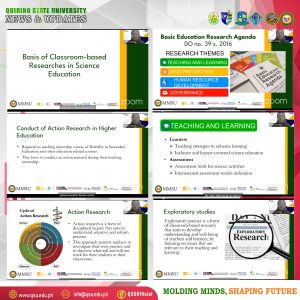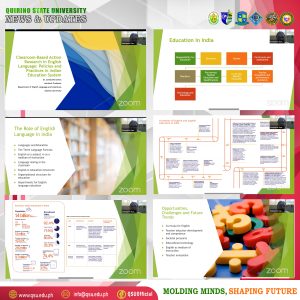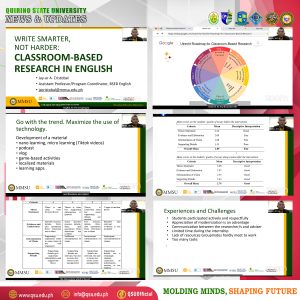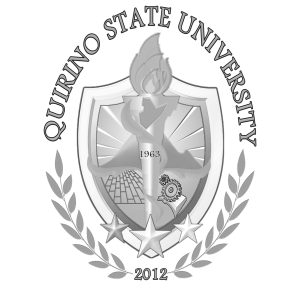In the finale of the International Lecture Series (ILS), esteemed educators from the organizing universities and colleges of QSU, BASC, MMSU, AU-India, and CTU-Vietnam gathered in synergy to discuss research-backed strategies proven to boost student learning in English, Mathematics, and Science. Their presentations covered the components, obstacles, methodology, and impact of addressing classroom challenges through action research.
The lectures on English language learning started with presentations by Dr. Maria Theresa B. Valerio, Dr. Eiffel N. Marcelo of BASC, Dr. Jay-Ar Cristobal of MMSU, and Dr. Somasree Santra of AU-India. Their research and insights centered on determining student learning levels and the factors affecting language acquisition. Dr. Valerio came up with concept mapping in improving the comprehension of the students in reading expository texts. Moreover, Dr. Marcelo shared the frameworks of dealing classroom challenges through Contrast and Error Analysis between the first and second language. Additionally, Dr. Cristobal’s study proved the effectivity of his ACTFreeE technique which stands for activate, freewrite, and evaluate. Moving across the border, Dr. Santra described the education in India as immensely complex attributed to its rich multilingualism, thus English studies in the country is challenging. The government of India integrated digital media in its education system to make learning easy.
For Science education, Mx. Amerigo B. Ramos, Jr. of BASC, Mr. Denson M. Liday of QSU, Prof. Christy Ann M. Rahon of MMSU, Dr. Somasree Santra of AU, India, and Dr. Lam Quoc Anh of CTU,Vietnam served as the resource speakers. In his research, Mx. Ramos established the beneficial effect of background music, specifically classical music, in enhancing students’ outcome. Mr. Liday emphasized the importance of identifying the research gap employing Technology Acceptance Model (TAM) in the university complex. Furthermore, Prof. Rahon described action research in 4 cycles – plan, act, observe, and reflect. Dr. Anh discussed the different types of research that commonly conducted by classroom teachers.
Following the speakers in English and her co-lecturers in Science, Dr. Moumita Dey summarized the context of action research. According to her, obstacles in conducting research can be solved through strategic planning, collaboration, leveraging available technology, and building network of supportive colleagues and administrators with the same interest-all these efforts summarized into three best practices: collaborate, connect, and create. She concluded that the impact of research goes beyond individual classroom. It promotes a spirit of professional growth and development among educators.
The lecturers of mathematics education acknowledged student math anxiety (Math phobia). To address such challenges in the classroom and to cultivate learning interests among students, Dr. Rosabel Acosta presented the Contextualized e-Magazine in Mathematics as one of their solutions. Mx. Ian Charles Blas elaborated the integration of games, interactive visual model, storytelling which counterpart the visual, auditory, and kinesthetic activities discussed by Mr. Amal Sankar Mukherjee. Finally, Ms. Mary Joy Agnes Alunday presented LumiApp as an avenue of upgrading mathematics interest, along with the academic performance of VitaLed, freshman students of mathematics in the modern world. It covered financial mathematics and logic.
The lecture series was held on April 26, 2024 via Zoom and streamed live on the QSU Facebook page. The event concluded with a message of gratitude from Dr. Romiro Bautista, IRO of QSU and lead organizer, for everyone’s contribution to the series’ success.
| QIO with President Hermenegildo F. Samoy, Jr., PhD
